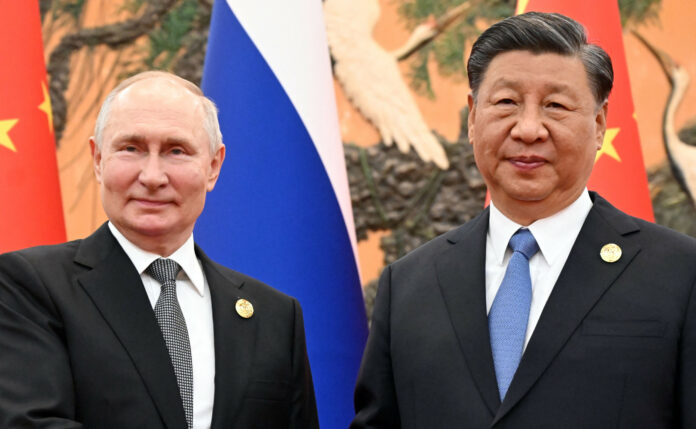Russian companies with business interests in China are reporting significant payment bottlenecks amid revelations that at least nine Chinese banks have stopped processing transactions from Russia, including those made in yuan.
Russia’s Izvestia newspaper reported on Thursday that an “immediate” suspension—notified to clients but not made known to the wider public—had been affecting cross-border settlements since at least mid-January.
Some of China’s largest credit institutions, which previously settled both ruble and yuan transactions originating from Russia, put dealings on hold after the United States introduced tougher sanctions in December that specifically targeted banks and other financial firms that, knowingly or unknowingly, facilitate the transfer of banned goods to Russia, threatening them with secondary sanctions.
On the whole, economic ties between the two countries have soared in the two years since Moscow’s invasion of Ukraine, buoyed in part by greater Chinese access to Russia’s markets as well as more Russian oil and gas exports amid sweeping sanctions, making its neighbor an easy outlet and a vital economic lifeline.
The neighbors reached a record $240 billion in two-way trade last year, up 26.3 percent and ahead of schedule, President Vladimir Putin’s top officials and their counterparts under Chinese leader Xi Jinping say bilateral relations are at their best level yet, a closeness driven by shared strategic interests, and which has trickled down to both militaries.
Traders in both countries, however, still face significant risks. For China’s financial institutions, especially those with sizable dollar and euro stakes, it is the possibility of secondary sanctions in the West. For Russian importers, it is the knowledge that their payments could be rejected at any time.
As of this week, the Chinese banking firms that had stopped accepting yuan payments from Russia included Ping An Bank, Bank of Ningbo, the Chinese subsidiary DBS Bank, Great Wall West China Bank, China Zheshang Bank, China Guangfa Bank, Kunshan Rural Commercial Bank, Shenzhen Rural Commercial Bank, and Dongguan Rural Commercial Bank, according to Izvestia, citing sources in Russia’s banking sector.
The banks which had already suspended dollar transactions were now following the lead of other major credit institutions that had stopped doing business with Russia altogether in 2022, the paper said, attributing the decision to concerns about the international capital they each hold.
China’s Commerce Ministry and Russia’s Foreign Ministry could not be reached for comment.
SERGEI GUNEYEV/POOL/AFP via Getty Images
Izvestia said local traders first caught wind of delays and suspensions in December, around the time of President Joe Biden’s new executive order, when Chinese and Turkish banks acted out of an abundance of caution.
Zhejiang Chouzhou Commercial Bank, which led settlements for Russian importers, then struck a major blow by halting its operations with Russia and Belarus.
Since the beginning of the year, three of the four largest Chinese banks—the Industrial and Commercial Bank of China, China Construction Bank, and the Bank of China—have stopped accepting payments from Russian credit institutions that are subject to international sanctions, according to the newspaper, although their dealings with non-sanctioned Russian banks appeared to be ongoing.
Russia’s Deputy Foreign Minister Andrey Rudenko denied last month that Russian businesses were experiencing problems with payments to China, but admitted several Chinese banks had taken “a precaution” for fear of secondary sanctions.
Working alternatives for Russian companies now include opening a bank inside China or in Hong Kong, or banking from “friendly countries,” Izvestia said.
Business owners who spoke to the paper said they expected the Russians and Chinese governments to resolve issues around cross-border payments by announcing new mechanisms.
Putin and Xi are expected to meet in China next month during the Russian leader’s annual visit, according to Reuters.
Uncommon Knowledge
Newsweek is committed to challenging conventional wisdom and finding connections in the search for common ground.
Newsweek is committed to challenging conventional wisdom and finding connections in the search for common ground.


